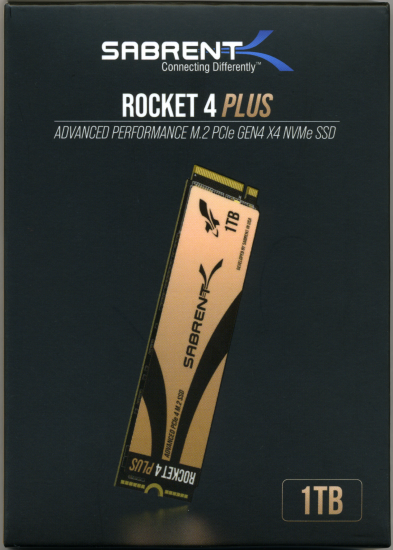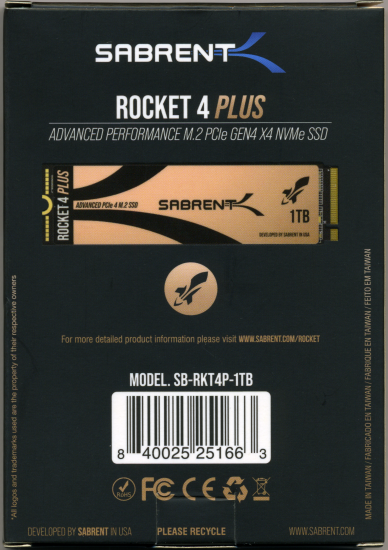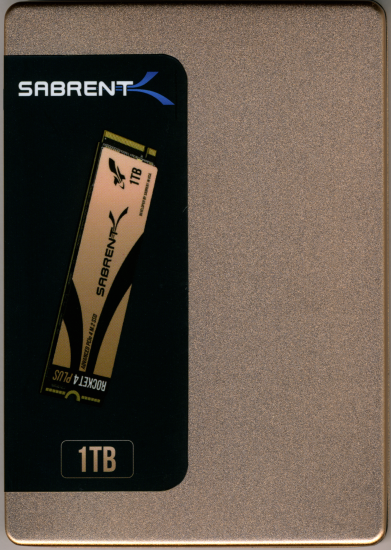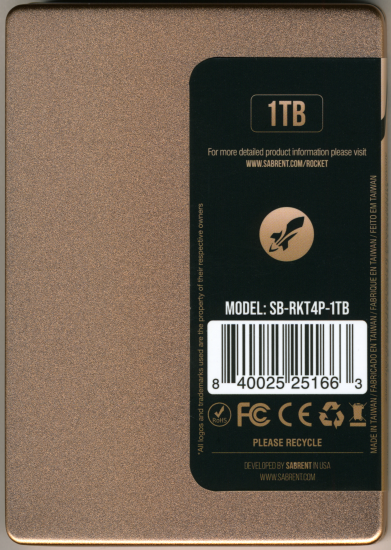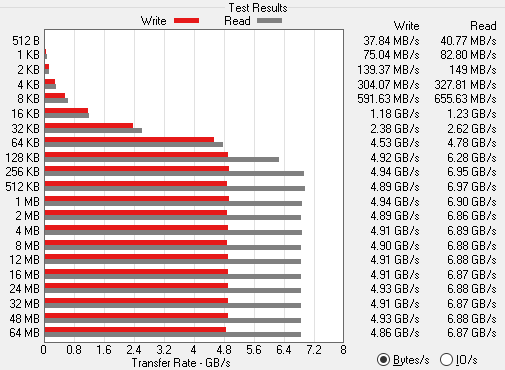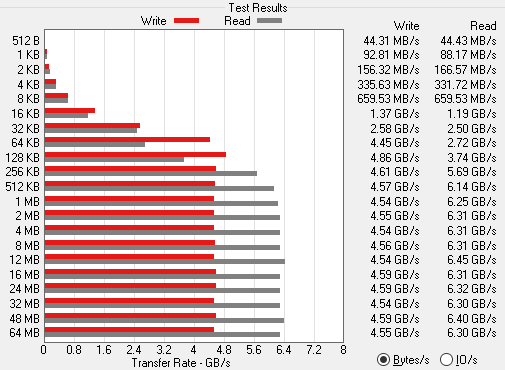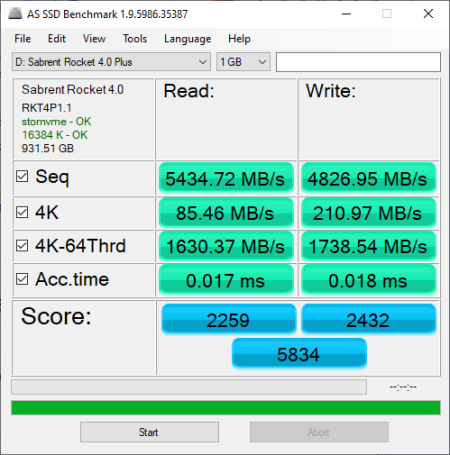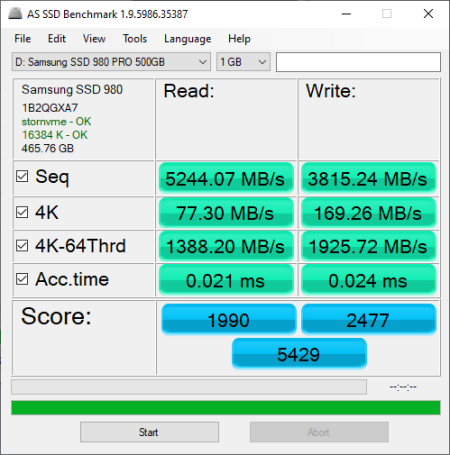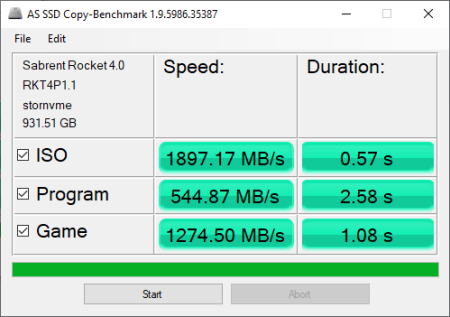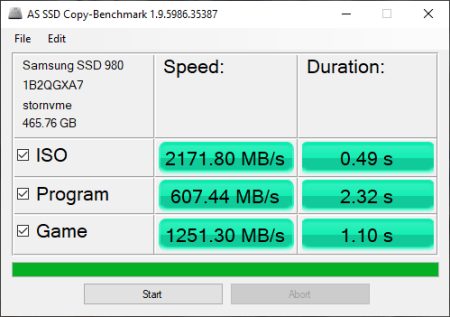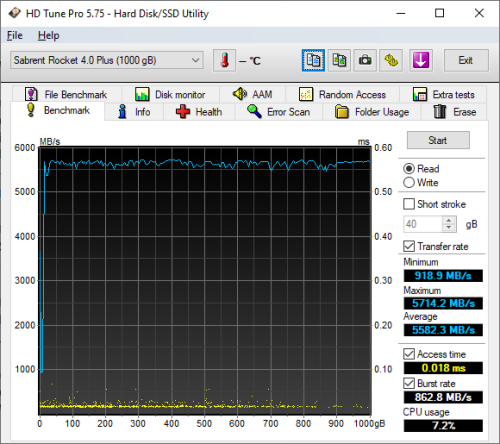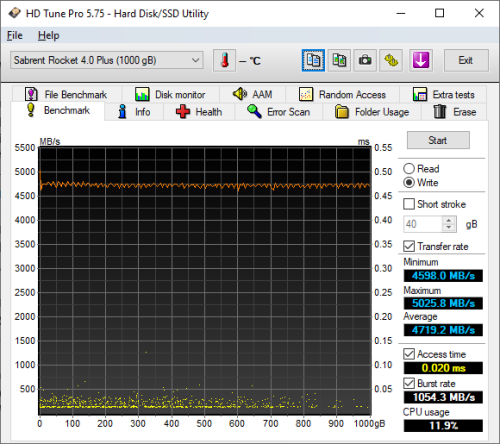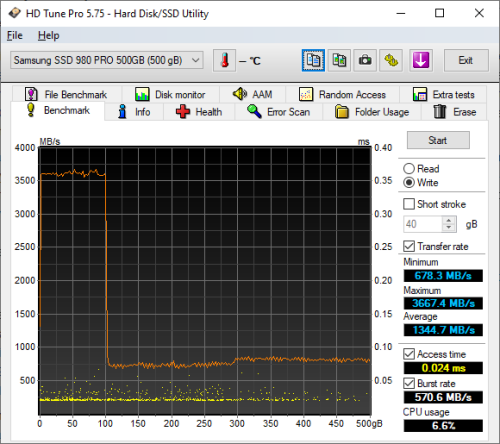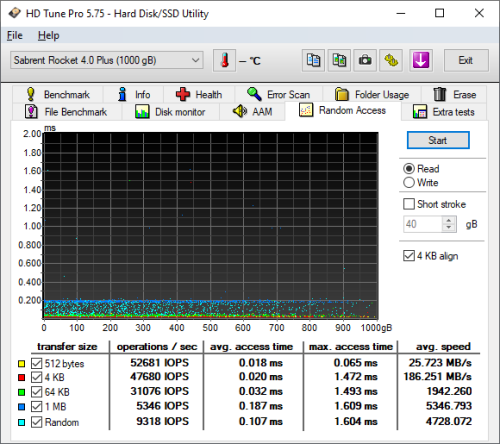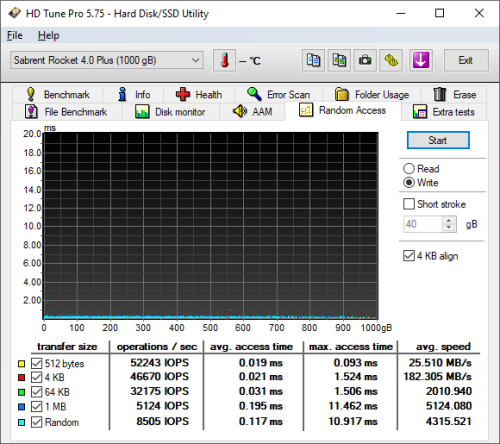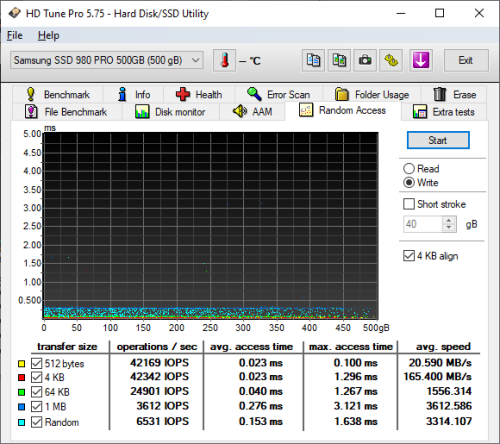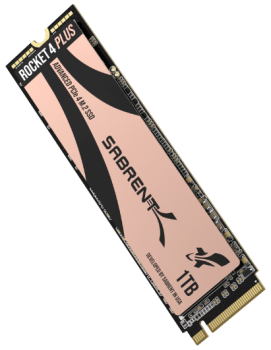

Model: Sabrent Rocket 4 Plus 1TB NVMe PCIe 4.0 Solid State Drive
Manufacturer: Sabrent
Provided By: Sabrent
As a leading manufacturer of computer peripherals and accessories, Sabrent doesn't need much of an introduction. Founded in 1998 in Pittsburgh, PA, the company started out by delivering products like hard drive enclosures, display adapters and converters, card readers and USB hubs that incorporated style, quality and the latest technologies available. Since then, Sabrent's product lineup has continued to evolve, including the launch of its Rocket series of internal and external SSDs. These cutting-edge drives have quickly caught the attention of consumers and enthusiasts alike due to their ability to provide quality and performance at a reasonable price.
This winter, Sabrent released its latest NVMe SSD, the Rocket 4 Plus. Designed for enthusiasts, gamers and professionals looking for unrivaled performance, this compact, M.2 form factor SSD is powered by Phison's new PS5018-E18 controller and is available with up to 4TB of 3D TLC NAND flash. The Rocket 4 Plus also supports SMART and TRIM commands and offers features like advanced wear leveling, bad block management, error correction code and over-provisioning. To top it all off, the drive is equipped with an ultra-fast PCIe Gen4 x4 NVMe 1.3 interface to deliver up to 7,100 MB/s read and 6,600 MB/s write speeds.
The Rocket 4 Plus is available in 1TB and 2TB capacities with a 4TB version coming later this year. For this review, Sabrent sent us the 1TB version of the drive, which is capable of delivering up to 7,000 MB/s sequential read and 5,300 MB/s sequential write speeds as well as up to 350K random read and 700K random write IOPS.
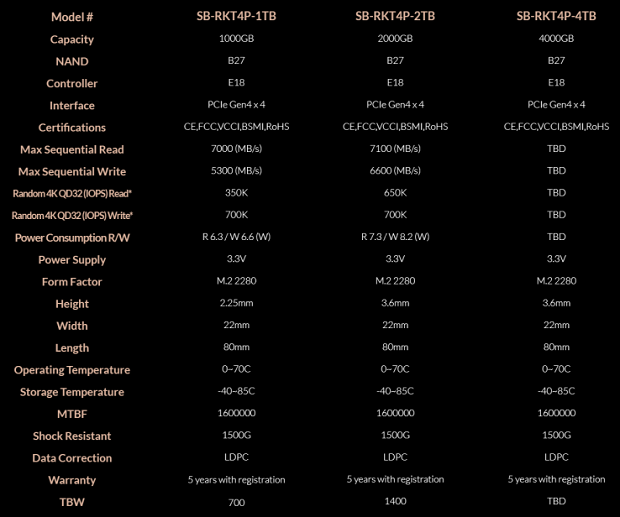
Needless to say, this is only a taste of what the Rocket 4 Plus has to offer. To give you an idea of what to expect, we'll take a closer look at Sabrent's new NVMe SSD and then see how well it performs. Does the Rocket 4 Plus have what it takes? Can it deliver the performance that people have come to expect from Sabrent? Keep reading as we find out.
The Rocket 4 Plus comes in a small, black box. Along with a picture of the drive, the front advertises a few of its key features including its 1TB capacity and PCIe Gen4 x4 interface.
Instead of a flimsy plastic tray or clamshell, the Rocket 4 Plus is packed inside a copper colored aluminum case. Inside this case, you'll find the SSD as well as an installation guide.

Physical Features:
The Rocket 4 Plus uses the 2280 form factor for M.2 (NGFF) SSDs. It measures 80 x 22 x 3.36 mm and weighs in at 9g. The drive also has an "M key" edge connector which provides PCIe SSDs with up to 4x lanes of bandwidth.

The Rocket 4 Plus is one of the first drives to use Phison's new PS5018-E18 controller chip. This PCIe Gen 4 x4 SSD controller is powered by a triple-core ARM Cortex R5 processor with CoXProcessor technology and supports eight channels with up to 32 chip enables (CE) per channel. The E18 also offers features like AES encryption, end-to-end data path protection, SmartECC technology and Phison’s 4th Generation LDPC ECC engine.

For the 1TB version of the Rocket 4 Plus, Sabrent opted to use Micron's 96-layer TLC 3D NAND flash. Underneath the copper colored heat spreader, you'll find four 256GB NAND flash packages as well as a single 1GB SK Hynix DDR4 SDRAM memory chip that is used for caching.
The test system used in this review is equipped with an AMD Ryzen 3 3100 CPU, MSI B550 GAMING PLUS motherboard, 16GB (8GB x 2) of Crucial Ballistix 3200 MHz DDR4 memory, Crucial P5 1TB SSD and a GIGABYTE GeForce GTX 1060 WINDFORCE OC 6G graphics card. For the operating system, I used the latest version of Windows 10 Pro.
To test the performance of Sabrent's Rocket 4 Plus SSD, I ran a series of benchmarks using CrystalDiskMark, HD Tach RW, ATTO Disk Benchmark, AS SSD, HD Tune Pro, Anvil's Storage Utilities, Iometer and PCMark. For comparison, I've also included test results from the WD_BLACK SN850, Silicon Power US70, ADATA XPG GAMMIX S50 Lite, Silicon-Power UD70, Crucial P2, Samsung's 980 PRO, SK hynix Gold P31, Crucial P5, ADATA SWORDFISH, ADATA FALCON, Lexar NM610, Silicon Power P34A60, Patriot P300, Plextor M9PG Plus, Plextor M9PY Plus, ADATA XPG SX6000 Pro, Western Digital WD_BLACK SN750, Samsung 970 EVO Plus, ADATA XPG SX8200 Pro, Crucial P1, ADATA XPG SX8200, Western Digital WD_BLACK NVMe, Samsung 970 EVO, Samsung 970 PRO, Plextor M9Pe, Plextor M8Se, Patriot Hellfire, ADATA XPG SX8000, Samsung 960 PRO, Toshiba OCZ RD400, Samsung 950 PRO, Samsung 870 QVO, Silicon Power PC60, SK hynix Gold S31, ADATA Ultimate SU750, Samsung 860 QVO, Samsung 860 PRO and Crucial MX500.
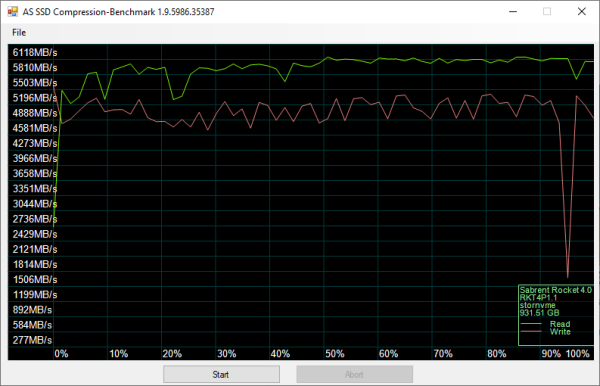
As I mentioned earlier, the Rocket 4 Plus uses Phison's PS5018-E18 controller chip. Looking at the screenshot above, you can see that it performs equally well with both incompressible (0%) and compressible (100%) data.
CrystalDiskMark 7.0.0:
First, I ran a few quick tests using CrystalDiskMark. This benchmark measures the performance of a storage device by testing its sequential and random read and write speeds. For this test, we're using the peak and real world profiles.
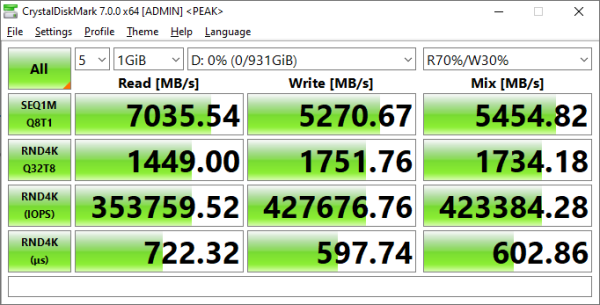
According to Sabrent, the 1TB Rocket 4 Plus is capable of reading at 7,000 MB/s and writing at 5,300 MB/s. While the drive had no problems reaching its rated read speed, it came up a bit short in CrystalDiskMark's sequential write speed test.
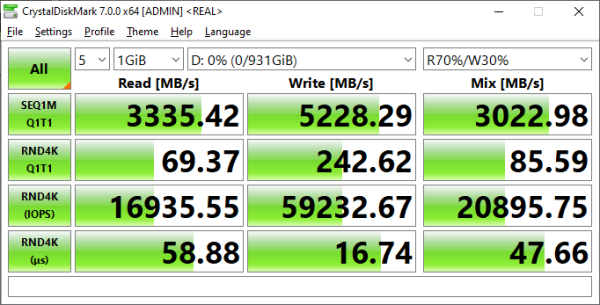
As you'd expect, the Rocket 4 Plus wasn't as fast when tested with the "real world" profile which uses a single thread and a much lower queue depth. Nevertheless, it was still able to read at 3,335 MB/s and write at more than 5,200 MB/s.
HD Tach RW 3.0.4.0:
Next, I used HD Tach to test the Rocket 4 Plus' read, write and burst speeds as well as its random access time and CPU usage.
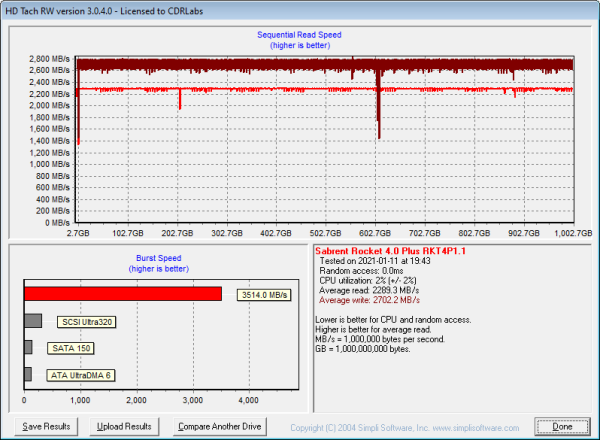
Looking at the screenshot above, you can see that the Rocket 4 Plus had average read and write speeds of 2289.3 MB/s and 2702.2 MB/s respectively, as well as a burst speed of 3514.0 MB/s.
ATTO Disk Benchmark 4.01:
I also used ATTO Disk Benchmark to test the Rocket 4 Plus' sequential read and write speeds. The tests are run using blocks ranging in size from 512B to 64 MB and the total length set to 256MB.
When tested with ATTO, the Rocket 4 Plus' read speeds topped out at about 6.97 GB/s and its write speeds at 4.94 GB/s.
AS SSD:
AS SSD is a relatively new benchmark designed specifically for solid state drives. The application contains five synthetic tests used to determine the sequential and random read and write performance of a drive.
AS SSD also includes a copy benchmark. This test copies an ISO (two large files), program (many small files) and game (small and large files), returning the speed and duration of each.
HD Tune Pro 5.75:
Next, I ran a series of tests using HD Tune Pro. This hard disk utility measures a drive's performance by testing its sequential read and write speeds as well as its access time, burst rate and CPU usage. For this review, I'm also going to use it to benchmark the Rocket 4 Plus' random read and write speeds, random access times and the number of operations per second.
The Rocket 4 Plus performed relatively well when benchmarked with HD Tune. The drive had average read and write speeds of 5,582.3 MB/s and 4719.2 MB/s, respectively.
When writing 4KB blocks, the Rocket 4 Plus reached 46,670 IOPS and had an average speed of 182.305 MB/s. The drive was even faster when reading, reaching 47,680 IOPS with an average speed of 228.650186.251 MB/s.
Anvil's Storage Utilities:
Anvil's Storage Utilities is another benchmark designed with SSDs in mind. The standard storage benchmark measures a drive's performance by testing its transfer speeds, access times and IOPS.

Iometer:
Lastly, I ran a series of tests using Iometer. This tool can be configured to benchmark a number of things. In this case, I used it to measure the Rocket 4 Plus' read and write speeds and the number of operations per second. The tests were run using random bytes and a queue depth of 3.
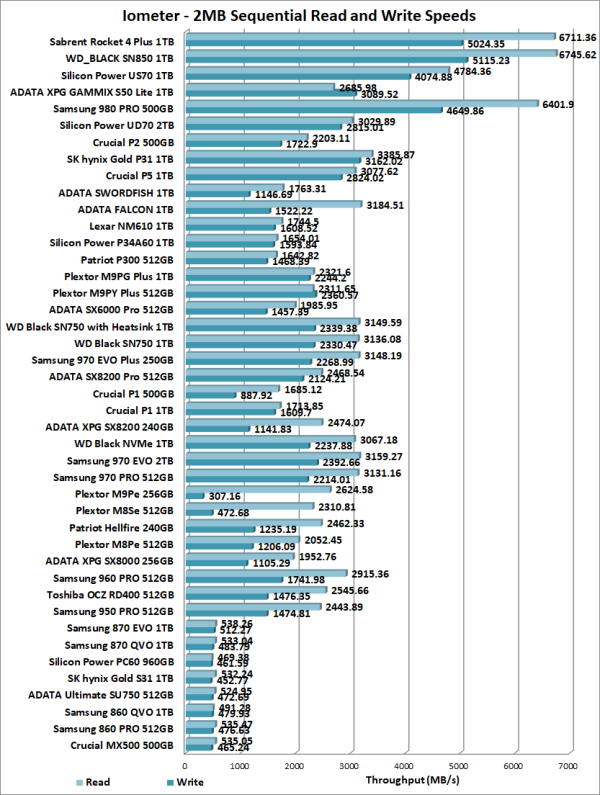
The Rocket 4 Plus' performance was very similar to what we saw in our other tests. The drive was able to read at 6711.36 MB/s and write at 5024.35 MB/s.
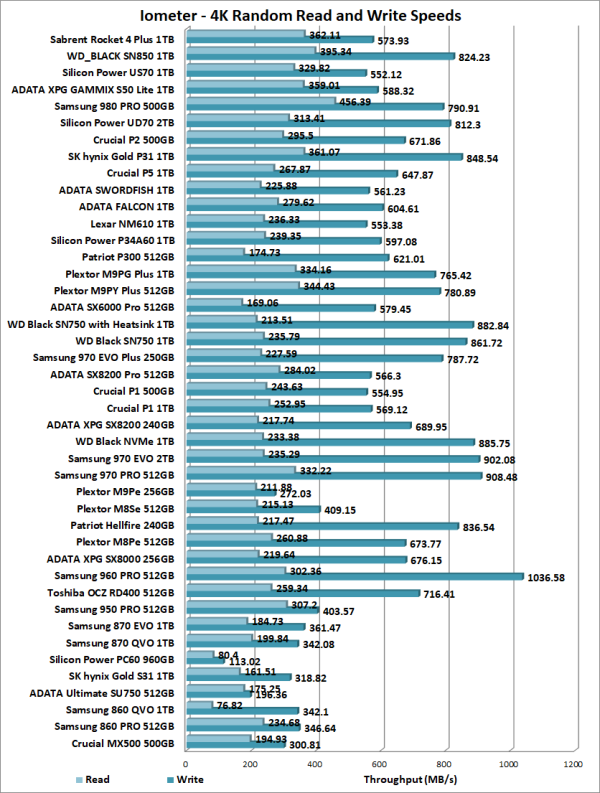
The Rocket 4 Plus' random read and write performance was hit and miss when tested with Iometer. While the drive was able to read at a respectable 362.11 MB/s, its write speed averaged out at only 572.93 MB/s.
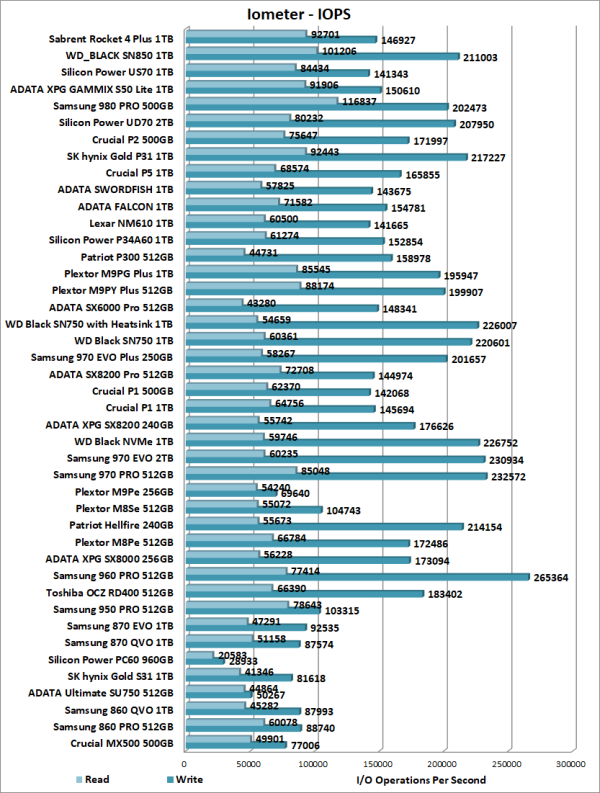
According to Sabrent, the 1TB Rocket 4 Plus is capable of 350,000 IOPS when reading and 700,000 IOPS when writing 4K blocks. With two threads and a queue depth of three, the drive reached 92,701 random read IOPS and 146,927 random write IOPS.
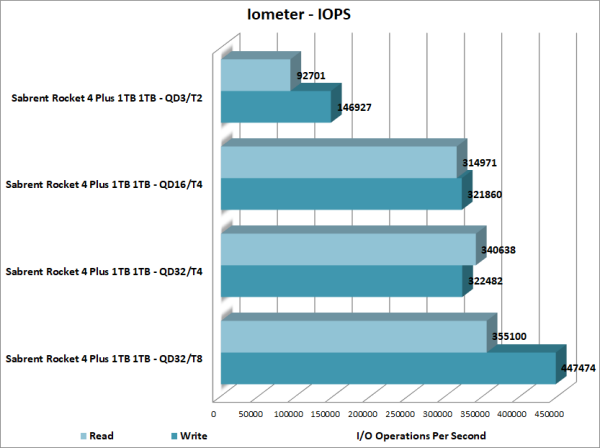
As with most drives, the Rocket 4 Plus performed better with more threads and at higher queue depths. With eight threads and the queue depth set to 32, it reached 355,100 random read IOPS and 447,474 random write IOPS.
PCMark 8 - Storage Test:
PCMark 8 is a complete benchmark for Windows. It includes five benchmark tests, each designed around a specific scenario. The storage benchmark measures drive performance using real-world traces recorded from Adobe Creative Suite, Microsoft Office and a selection of popular games.
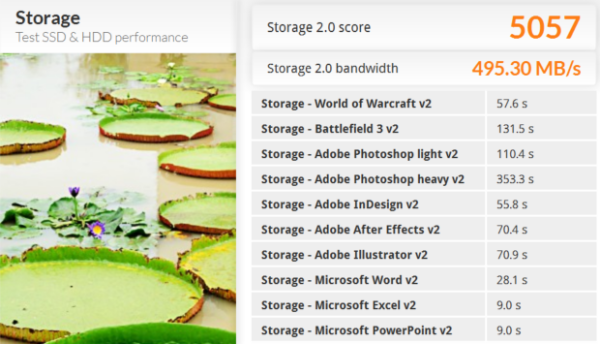
PCMark 8 also includes a consistency test which measures the performance consistency and degradation tendency of a storage system. The test reports the performance level at the start, the degraded steady-state and the recovered state as well as the number of iterations required to reach the degraded state and the recovered state. For this test, we are focusing on the Adobe Photoshop (Heavy) trace and will look at both the bandwidth and latency of the drive

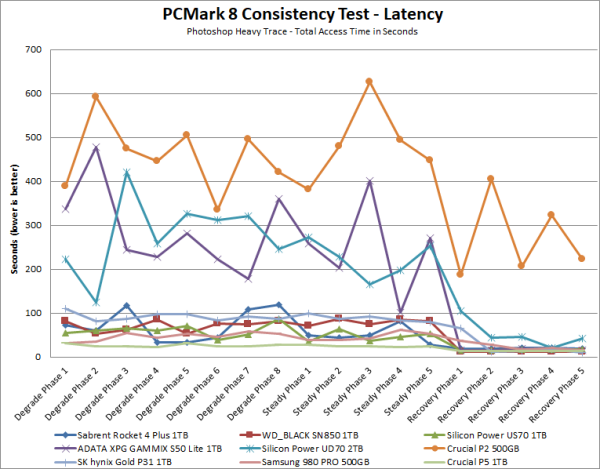
The Rocket 4 Plus' performance was hit and miss in this test. The drive was relatively quick during the degradation and steady phases. However, it lagged behind the SK hynix Gold P31 and Crucial P5 during the recovery phase, topping out at only 811 MB/s.
PCMark 10 - Full System Drive Benchmark:
PCMark 10's Full System Drive Benchmark uses a wide-ranging set of real-world traces from popular applications and common tasks to fully test the performance of the fastest modern drives. This benchmark produces an overall score as a measure of drive performance. Comparing devices is as simple as comparing scores. The tests also measure and report the bandwidth and average access time performance for the drive.
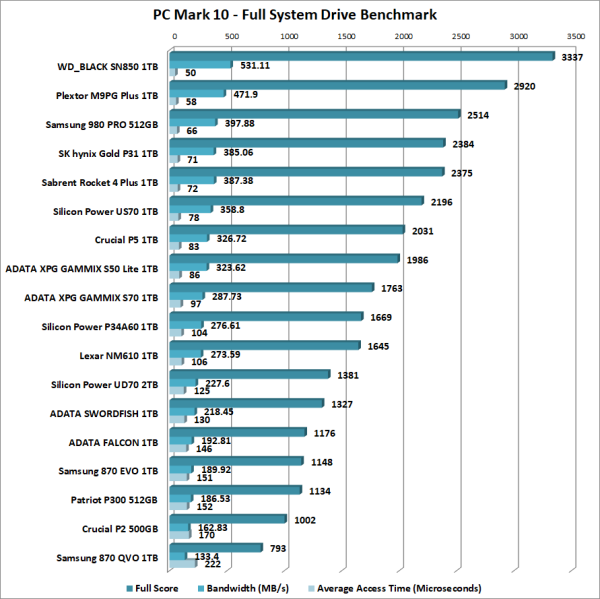
Thanks to its high bandwidth and low latency, the Rocket 4 Plus did fairly well in PCMark 10's Full System Drive Benchmark. Unfortunately, this wasn't enough to top the WD_BLACK SN850, Samsung 980 Pro or PCIe 3.0 SSDs like the Plextor M9PG and SK hynix Gold P31.
TRIM Performance:
While SSD's offer many benefits, there are some downsides to using flash memory. One of the biggest issues people run into is performance degradation. Over time, an SSD will run out of fresh blocks and will have to write over data the file system has marked as deleted. This procedure is very complicated and can slow an SSD's write speeds considerably.
To fix this problem, most manufacturers have added TRIM support to their SSDs. The TRIM command allows an operating system, such as Windows 10, to tell an SSD which data blocks are no longer in use. Using this information, the drive pro-actively erases these blocks and adds them to the free block pool.
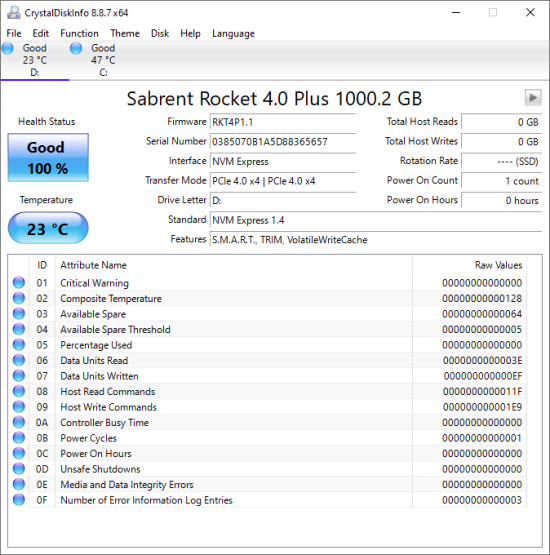
To test the Rocket 4 Plus's TRIM and garbage collection functions, I first put the drive in a "dirty" state. I used Iometer to fill 80% of the drive and then ran a random write test for 30 minutes. Looking at the screenshot below, you can see that the Rocket 4 Plus's average read and write speeds dropped to 2420.93 MB/s and 341.40 MB/s, respectively.
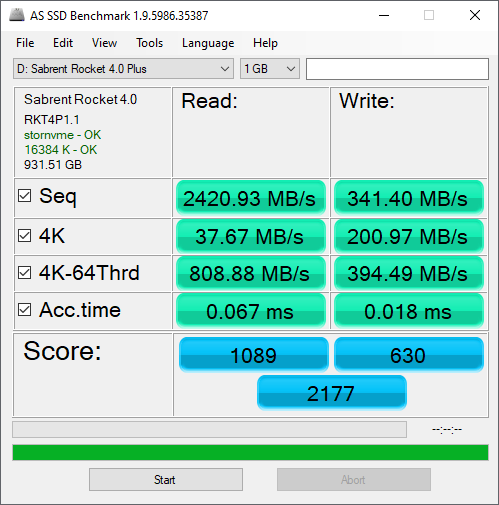
Sabrent Rocket 4 Plus - Dirty
To see how well the Rocket 4 Plus could recover, I let the computer sit for about 30 minutes and then reran the test. The drive's average write speed climbed up to 5323.98 MB/s. However, its read speed lagged behind, averaging out at only 1046.84 MB/s.
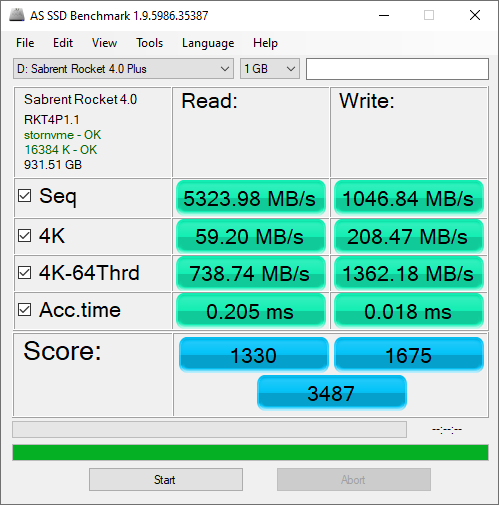
Sabrent Rocket 4 Plus - After TRIM
Lastly, I used Parted Magic to perform a secure erase on the Rocket 4 Plus. With the drive wiped clean, it had average read and write speeds of 5556.91 MB/s and 4827.36 MB/s, respectively.
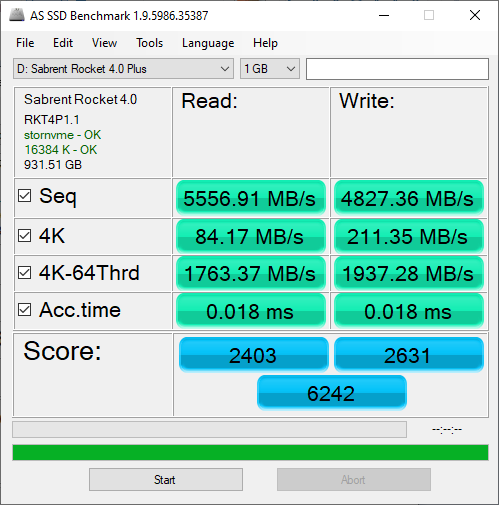
Sabrent Rocket 4 Plus- Secure Erased
Final Thoughts:
The Rocket 4 Plus is the first SSD from Sabrent to come through the 'Labs and to be honest, they could not have made a better first impression. This compact, M.2 form factor drive is powered by Phison's highly anticipated PS5018-E18 controller and is available with up to 4TB of 3D TLC NAND flash. Combine this with a large DRAM cache and a PCIe Gen4 x4 NVMe 1.3 interface and you have one of the fastest consumer SSDs on the market today. In our sequential read and write tests, the 1TB version of the Rocket 4 Plus was able to read at speeds as high as 7,035 MB/s and write at speeds in excess of 5,200 MB/s. It also did fairly well in our random write tests, producing nearly 147,000 IOPS at low queue depths.
Impressive performance isn't the only thing the Rocket 4 Plus has to offer. Along with support for SMART and TRIM commands, the drive features advanced wear leveling, bad block management, error correction code and over-provisioning. The Rocket 4 Plus also comes with Acronis True Image for easy cloning and is covered by a five year warranty.
The Rocket 4 Plus is available now in 1TB and 2TB capacities and can be purchased through retailers like Amazon for $300 and $400, respectively. If you need more storage, Sabrent plans to release the 4TB version of the drive later this year. At this point, there is no word on when exactly it will be available or how much it will be.

Highs:
- Available in 1TB, 2TB and 4TB capacities
- PCIe 4.0 x4 interface with NVMe protocol
- Phison PS5018-E18 controller
- Equipped with 3D TLC NAND flash
- Excellent sequential read and write speeds
- Good random read and write performance
- Small M.2 2280 form factor
- Large DRAM cache
- Supports TRIM and garbage collection
- Advanced Wear Leveling, Bad Block Management, Error Correction Code and Over-Provisioning
- Awesome packaging
- 5 year warranty (with registration)
Lows:
- Pricey
- Does not support hardware based encryption
